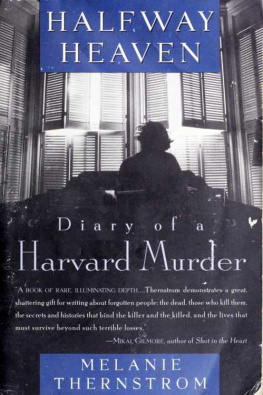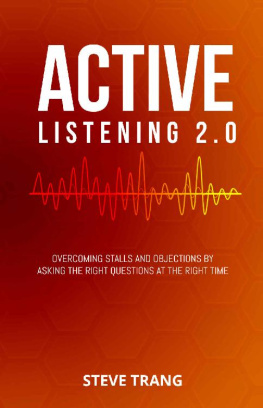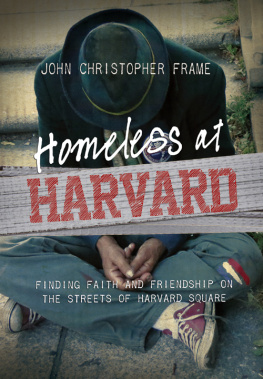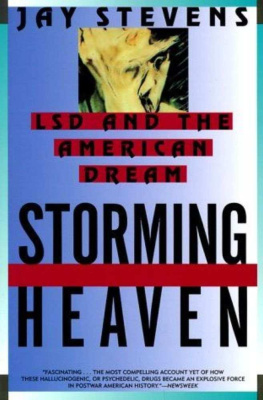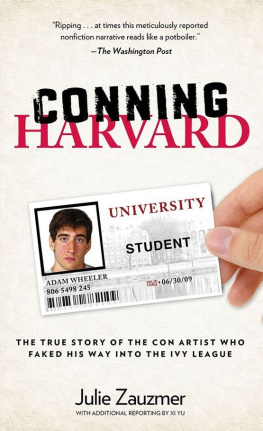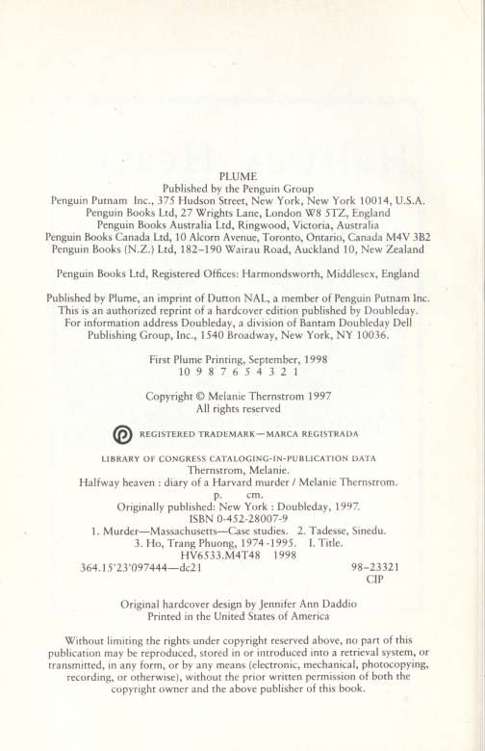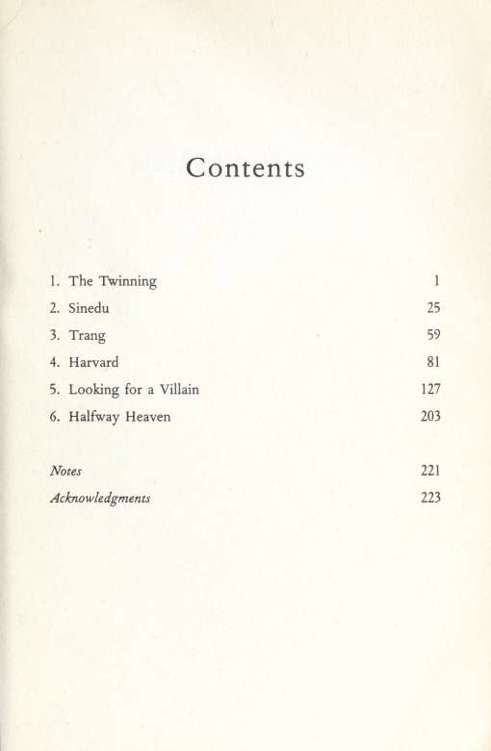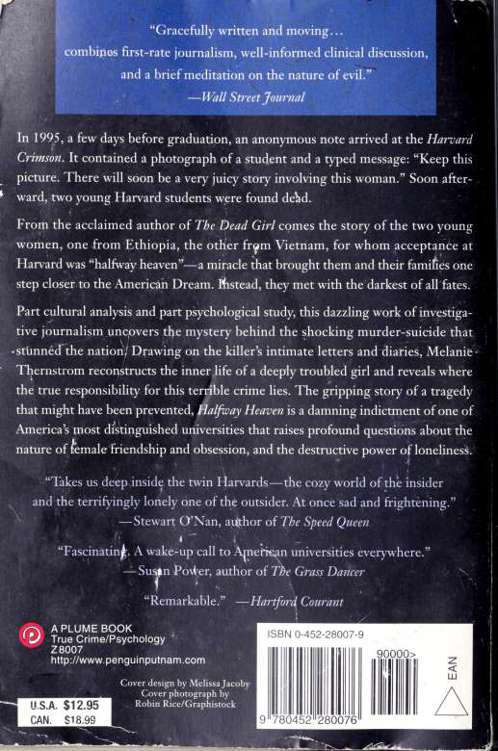This book made available by the Internet Archive.
For Thao Nguyen
Lalefew kiremt bet ayseram.
You can't build a house for last winter.
Amharic saying
Halfway Heaven
The Twinning
There is an aristocracy to which the sons of Harvard have belonged... the aristocracy which excels in manly sports, carries off the honors and priies of the learned professions, and bears itself with distinction in all fields of intellectual labor and combat; the aristocracy which in peace stands firmest for the public honor and renown, and in war rides first into the murderous thicket.
Charles W. Eliot, president of Harvard
(1869)
Harvard's commencement is among the most festive in the land. By the first week of June the square of lawn between Widener Library and Memorial Chapel has been reseeded and grown new and green again. A large pastel tent has been erected, as if in preparation for an enormous wedding, and red silk flags are strung all around on trees, bearing the Harvard motto "Veritas" and the insignia of each of the Harvard houses where undergraduates live. World eminences give historic speechesMother Teresa, Colin Powell, Vaclav Havel. The Marshall Plan was announced at the commencement of 1947.
The whole of undergraduate life at Harvard seems to lead toward the moment of graduation. With a ninety-seven percent graduation rateamong the highest in the countrystudents understand that to attend Harvard is to have the opportunity to graduate from Harvard, and all that that bestows upon one. On one's resume, at work, on a blind date, it is a fact that connotes not so much intelligence as chosennessa destiny to do significant, lucrative work, a kind of good luck charm whose spell is always new.
As the seniors are welcomed to the company of educated men and women, their parents clap and cryit is their laudes too. Among the most touching sights are the immigrant parents: gathered around their sons and daughters, the American Dream seems alight in their faceseverything they journeyed to this country for accomplished in a moment.
The speaker for the 1996 commencementHarvard's three hundred forty-fifthis Dr. Harold Varmus, director of the National Institutes of Health. He gives an earnest account of his journey from studying literature at Harvard to committing to medicine when he realized the power medicine has to alleviate human suffering. He describes the enormous progress of medicine in his lifetimethe development of the kidney transplant and the cure of polio, the crip
MELANIE THERNSTROM
pling disease of his childhoodand reminds the audience how much there is still to be done. He enjoins the new graduates to enlist in the front lines on the battlefields of science.
There is no reference, in his speech or throughout the long commencement day, to two girls who are not there to graduate with their class, and whose fate reflects a problem that has not disappeared with the progress of medicine: the problem of evil.
On May 28, 1995, shortly before the previous commencement, Sinedu Tadesse, a twenty-year-old junior from Ethiopia, murdered her roommate, Trang Phuong Ho, an immigrant from Vietnam. The girls had lived together for two years, but during the spring of their junior year Trang had decided not to live with Sinedu again and had chosen new roommates for senior year. During the last week of term, Sinedu sent a photograph of herself and an anonymous typewritten note to the student newspaper. The note said: "Keep this picture. There will soon be a very juicy story involving the person in this picture."
The morning that students were supposed to move out of their residence, Dunster House, for the summerthe Sunday of Memorial Day weekendSinedu set her alarm for early in the morning, and then stabbed Trang forty-five times with a knife as she lay sleeping in her bed. Lying beside Trang, sleeping head to toe, was a visiting girlfriend, Thao Nguyen, a recent Vietnamese immigrant who had been staying with her for the weekend. Thao awoke to see her friend being stabbed and tried to grab the knife from Sinedu, but was injured herself and went for help. She ran downstairs, bleeding, into the courtyard, where students called the police, but by the time they came Sinedu had hanged herself in the bathroom, with a noose she had prepared ahead of time, and both girls were dead.
HALFWAY HEAVEN
The events were met with stunned bewilderment. "The questions were endless. Could Harvard have intervened? Why did Tadesse snap? Were there unseen warning signs? Why does evil exist?" Newsweek asked. "The sense of mystery is unlikely to lift anytime soon," People magazine wrote. "Neither Student Complained of Problems," the Boston Globe reported. Another Globe story quoted a Harvard official: "There is no conventional motive. It is not about sex or revenge. There is no apparent reason." Under the heading "Harvard Deaths Leave a Puzzle Whose Central Piece May Never Be Found," the New York Times reported that "interviews with students and faculty members who knew the two women... indicate that the key to last weekend's events has thus far eluded everyone."
The media descriptions of Sinedu and Trang invariably made them sound like twins: polite, gentle-mannered, petite, five-feet-tall, hard-working twenty-year-old foreign premed junior biology majors "destined for some of life's highest pinnacles." Under the heading "Two Quiet Students Whose Paths Met," the New York Times detailed the twinning: "They certainly seemed well matched. Both had risen from humble circumstances... Ms. Tadesse's father had been a political prisoner. At age ten Ms. Ho had escaped from Vietnam on a fishing boat... both women dreamed of becoming doctors so they could help others. Both hewed to the family-centered traditions of their homelands, and both were valedictorians of their high school classes."
The deaths were also seen as wrapped in the mythology of Dunster House. Old and beautiful, by the banks of the Charles River, Dunsterone of thirteen upper-class residenceshas an aura of gloom, and was connected with two previous suicides that spring. Students in the house recalled having seen the two students always together, taking courses, studying, or eating. As Leslie Dunton-Downer, a junior fellow at the Harvard Society of Fellows and an
Next page
